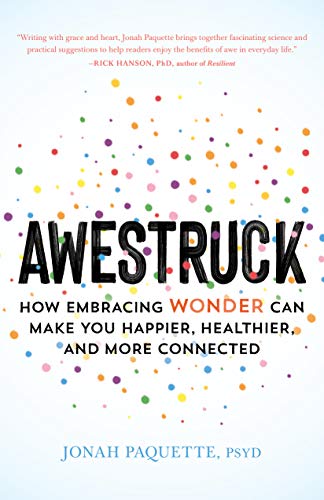How Wonder and Awe help us transcend self, regulate stress, and improve well-being
We have all experienced it, even if we didn’t know what to call it. Whether we’re overlooking a beautiful view after a challenging hike or watching a new leaf grow on the plant we’ve been nurturing in lockdown, the feeling we get in that moment—amazed, inspired, transported—is what researchers call awe.
In his new book, Awestruck, psychologist Jonah Paquette explains the process underlying the experience of awe and uncovers both its complexity and its value to our well-being. Walking readers through various scientific findings, he shows that awe helps improve our relationships, decrease our stress, and make us happier. By illustrating awe’s many benefits, Paquette gives us a reason to seek more awe experiences in our lives—and then shows us how to do it.
How we experience awe
An awe experience, as Paquette defines it, involves two primary components: encountering “vastness” and experiencing transcendence. Vastness happens when we come across a view (like a spectacular sunset) or concept (such as the existence of black holes) that is too incredible to fit into our current worldview, forcing us to expand our understanding of what is possible. Transcendence happens when we take in this new, awe-striking idea or image in front of us and try to make sense of it.
Not only is awe a pleasant feeling akin to wonder, it also helps us to experience a different relationship with the world around us, says Paquette. When we are overcome with awe, he explains, we often experience a “small self”—the sense of our ego becoming smaller, and our needs, hopes, and purpose more integrated with the people and environment surrounding us.
“Awe blurs the line between the self and the world around us, diminishes the ego, and links us to the greater forces that surround us in the world and the larger universe,” he writes. In that way, awe can serve a dual purpose, improving our well-being while bringing us together.
The benefits of awe
Like many positive emotions, awe can make us feel good. But awe goes beyond that, helping us to connect with others. Here are some of the main benefits of awe, as recounted by Paquette.
Awe decreases stress levels. Awe has been shown to reduce stress levels in both the short term and the long term. In one study described in the book, researchers examined the impact of an awe experience on stress levels among both urban high school students and war veterans. Participants taken on a one-day river rafting trip had reduced levels of stress and symptoms of PTSD that were maintained weeks later. Critically, it wasn’t just spending time outdoors that seemed to lead to reduced symptoms, but nature’s specific ability to induce a sense of awe.
The evidence supporting the link between spending time outdoors, experiencing awe, and lower stress levels “has become so persuasive that many physicians have begun to ‘prescribe’ time spent in nature or in green spaces, the way one might typically prescribe a new medication,” says Paquette.
Awe increases generosity and kindness. In a study conducted at UC Berkeley, researchers had students spend a minute either gazing up in the middle of the campus’s eucalyptus grove or staring at a drab science building. When a “stranger” (actually, someone working for the researchers) walked by and “accidentally” dropped a box of pens, participants who experienced awe by gazing up at the trees were more likely to help the stranger collect the pens. Later, the same participants also scored lower on entitlement and demonstrated a higher degree of ethical decision-making.
Other studies have also found a link between awe and generosity and kindness. Paquette suggests that these studies help explain why awe evolved: Feeling awe makes us more willing to help those in need, and in turn increases our sense of connection to others. At a community level, looking out for everyone and placing collective needs above our own gives us a greater chance of survival.
“By enabling us to feel connected to each other, form alliances, act generously, and explore new possibilities, it stands to reason that the story of humans would not be possible without awe,” he writes.
Awe makes us happier and more satisfied with life. Paquette points readers toward numerous studies that demonstrate how awe can impact our mood. In one study conducted a few years ago, participants were shown a slideshow of either commonplace nature scenes (like an oak tree) or awe-inspiring nature scenes (like the Grand Canyon) and were asked questions regarding their mood both before and after the slideshow. Both groups showed improvements in mood, but those who watched the awe-inspiring slideshow reported a far greater improvement.
While awe can make us happy in the short term, research has shown that this benefit lasts, too. In a study from UC Berkeley, researchers had participants track their mood and awe experiences over several weeks. They found that people experienced awe two times per week, on average, and that having awe experiences led them to have greater well-being and life satisfaction even weeks later.
These are only a few among multiple studies that, according to Paquette, confirm our intuition: Awe makes us feel good. By reducing stress, increasing generosity, and improving our life satisfaction, awe really is good for us.
Six Ways to Incorporate Awe Into Your Daily Life
Given that awe has these benefits, says Paquette, we should try to experience it more in our everyday lives. Though many of us may only associate awe with special vacations or occasions—like graduation ceremonies or visits to the Grand Canyon—he describes numerous ways we can incorporate awe into daily routines (and help intensify the experience, too).
1. Linger. When you catch yourself in awe, Paquette recommends sitting with that feeling for as long as possible. Though you may be tempted to move quickly onto the next thing, such as taking a photo or responding to a notification, try pausing first to soak in the surroundings for a bit longer.
2. Slow down. Create space for awe to emerge in the mundane. While you water your plants, tenderly check for new leaves and buds. While eating, consider the time and energy that went into the food in front of you. By slowing down and appreciating the patience and effort involved in habitual processes, Paquette assures us, we will find ourselves awe-inspired.
3. Appreciate your senses. Tune in deeply to your awareness of color, texture, scent, and sound. What do you hear? What do you see? While on a walk, stretching, or taking deep breaths, Paquette recommends we allow ourselves to sink into the senses that connect us to the world, and be in awe of what we find.
4. Unplug. While many of us are dependent on technology for work or for communicating with others, it’s good to intentionally step away from the screen and give yourself the opportunity to connect with yourself. Somewhat counterintuitively, technology can make us feel more isolated and lonely by pulling us away from the present moment, Paquette explains. He suggests ditching the phone and taking a walk, visiting a park, or making a meal, all without taking a photo or sharing it on social media.
5. Awe walks. Numerous studies have shown that spending time in nature lowers stress and improves our physical and mental health by decreasing blood pressure, enhancing focus, and strengthening our immune system. Experiencing awe is actually one of the main factors that make nature so powerful. Try taking an awe walk, intentionally seeking to be awed by your surroundings.
6. Awe journaling. Paquette urges us to think back to our most awe-inspiring vacations, events, and moments, and take the time to document them. Where were you? Who was there? How did you feel? This simple practice may decrease your sense of time pressure, and make you more generous, as well.
Why we need awe more than ever
Paquette wrote this book before the pandemic started, but it seems more relevant than ever. As we approach the one-year mark of pandemic restrictions and the emotional strain they have come with, the tried-and-true ways to take care of our mental well-being, such as calling a friend, exercising, and meditating, can sometimes feel stale.
Seeking awe is a unique way to reduce stress while simultaneously finding happiness and connection during this period. As Paquette helps us see, it doesn’t take much to experience awe. Just taking a walk in our neighborhood and observing our surroundings with intention can leave us awestruck and in a better state of mind.
And, given how hard this time has been, we could all use a bit more of that.
 – Teja Pattabhiraman is a senior at UC Berkeley, where she studies Public Health and Neurobiology to develop her interests in environmental health, mental wellbeing, and health equity. Based at UC-Berkeley, Greater Good highlights ground breaking scientific research into the roots of compassion and altruism. Copyright Greater Good.
– Teja Pattabhiraman is a senior at UC Berkeley, where she studies Public Health and Neurobiology to develop her interests in environmental health, mental wellbeing, and health equity. Based at UC-Berkeley, Greater Good highlights ground breaking scientific research into the roots of compassion and altruism. Copyright Greater Good.
Related reading:
- How Pixar’s “Soul” met the Science of Awe
- How feeling awe in nature can spur mental well-being and personal growth
- Awesome: Brain scans shed light on the brain networks supporting Awe
- New study reinforces the importance of walking through forests for mental and general health
- Solving the Brain Fitness Puzzle Is the Key to Self-Empowered Aging



